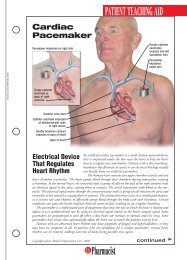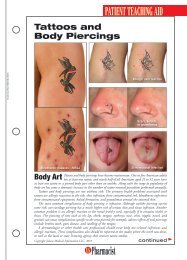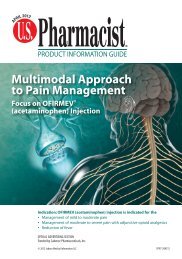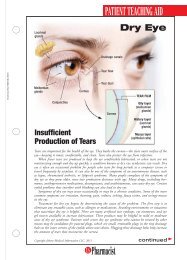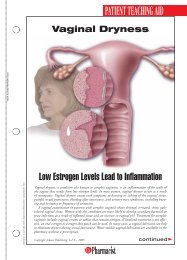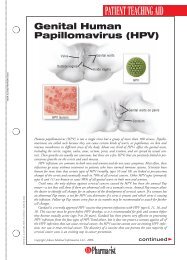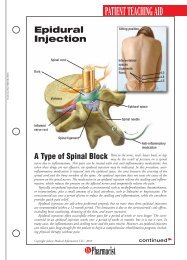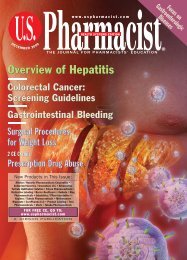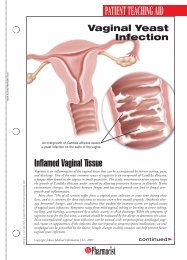View PDF Edition - U.S. Pharmacist
View PDF Edition - U.S. Pharmacist
View PDF Edition - U.S. Pharmacist
You also want an ePaper? Increase the reach of your titles
YUMPU automatically turns print PDFs into web optimized ePapers that Google loves.
PHARMACOLOGIC MANAGEMENT OF ALCOHOL DEPENDENCEto be a logical option given the evidence of lastingeffects and improved drinking outcomes. 20Combination TreatmentIt has been proposed that combination therapy mayresult in improved efficacy compared with monotherapy.17,21,22 Owing to their different mechanisms ofaction, it may be theoretically appropriate to combinethese agents for added benefit. Based on the literature,the combination of disulfiram and naltrexoneappears to offer no additional benefits over treatmentwith either medication alone. 23 Studies examiningthe combination of disulfiram and acamprosate indicatethat this combination may result in improved efficacy,but there is not much literature regarding concomitantuse of these drugs. 21The bulk of the literature centers on the combinationof naltrexone and acamprosate. The COMBINEtrial concluded that the concomitant use of these twomedications appeared to be safe and well tolerated, butprovided no additional therapeutic benefit versus naltrexonealone. 17 In another trial, 160 patients were randomizedto receive acamprosate, naltrexone, naltrexoneplus acamprosate, or placebo. 22 The combinationgroup had significantly lower relapse rates comparedwith the placebo group and the acamprosate group,but the combination was not more effective than naltrexoneonly. 22Overall, the combination of naltrexone and acamprosateappears to be safe and well tolerated, butthere may be an increase in certain adverse effects, suchas diarrhea and nausea. 22 The combination seems toprovide some benefit compared with acamprosate alone.Combination therapy may be a valid option for somepatients who are not responding to monotherapy. Furtherresearch is needed to clarify the utility of combinationtherapy in the treatment of alcohol dependence.Off-Label and Investigational TreatmentsRecently there has been a growing interest in exploringother potential treatments for alcohol dependence.Most new research focuses on agents that are proposedto target neurotransmitters that are affected by alcohol.These different classes of medications have beenused off-label in the hope that some new agents mayprovide promising treatments in the future.Topiramate, oxcarbazepine, lithium, carbamazepine,gabapentin, and divalproex are some of the mood stabilizersand anticonvulsants that have been evaluatedfor the treatment of alcohol dependence. 4,6,10 It isbelieved that some anticonvulsants, such as topiramate,are responsible for enhancing GABA activity and antagonizingglutamate activity, which may lead to decreasedalcohol consumption. 4,10,24 Topiramate appears to bethe best studied of the anticonvulsants thus far. Severalrandomized, controlled trials of topiramate havereported positive drinking outcomes (such as decreasedheavy drinking days and drinks per day) and increasedabstinent days compared with placebo. 10,24,25 One trialfound that patients treated with topiramate achieved26% more abstinent days than patients given placebo. 24Topiramate appears to hold promise as a treatmentfor alcohol dependence.Most of the other abovementioned drugs, such asoxcarbazepine and divalproex, do not have conclusivedata concerning their utility in treating alcohol dependence,and further research is needed. 10 Lithium currentlydoes not have supportive evidence as a treatmentfor alcohol dependence. 7Serotonergic agents constitute another medicationclass that has been researched for its value in treatingalcohol dependence. It is theorized that serotonin playsa role in alcohol consumption. 4,26 Literature exists concerningthe use of selective serotonin reuptake inhibitors(SSRIs) for the treatment of alcohol dependence; however,results are inconsistent and do not support theuse of SSRIs to treat alcohol dependence as a primarycondition. 4,6,7,26 It is thought that SSRIs may improvepsychiatric illness, which may have an effect ondrinking behavior. 27 Ondansetron has been associatedwith positive drinking outcomes such as fewer drinksper day, fewer drinks per drinking day, more abstinentdays, and more abstinent days per week. 6Dopamine antagonists may be involved in the treatmentof alcohol dependence. Olanzapine has exhibitedsome positive outcomes. 10 Other agents, such as baclofenand galantamine, also have been researched, but dataregarding their use are either mixed or negative. 10Currently, there are only a few options availablefor the treatment of alcohol dependence. The agentsmentioned above may hold some promise for the future,but more research is needed. Many of the current trialsof these agents are methodologically weak or haveinconclusive findings. For those reasons, further investigationis needed before these agents can be recommendedor used for the treatment of alcohol dependence.There is a great need for the discovery of newpotential options to treat alcohol dependence.ConclusionAlcohol dependence is a chronic disorder that has manyconsequences. Optimal treatment with pharmacologicagents may help achieve desired outcomes. The currentlyavailable treatments for alcohol dependence areall valid options, and their use should be individualized.<strong>Pharmacist</strong>s can optimize treatment by recommendingagents based on the expected outcomesassociated with each medication. <strong>Pharmacist</strong>s also canprovide care by educating patients regarding expectedoutcomes, adverse effects, and precautions associatedwith the pharmacologic agents.References available online at www.uspharmacist.com.65U.S. <strong>Pharmacist</strong> • November 2009 • www.uspharmacist.com



